Module 2 Unit 2 Friends 同步备课课件 (共79张PPT)
文档属性
| 名称 | Module 2 Unit 2 Friends 同步备课课件 (共79张PPT) |

|
|
| 格式 | pptx | ||
| 文件大小 | 9.7MB | ||
| 资源类型 | 试卷 | ||
| 版本资源 | 牛津上海版(试用本) | ||
| 科目 | 英语 | ||
| 更新时间 | 2023-11-20 10:08:52 | ||
图片预览

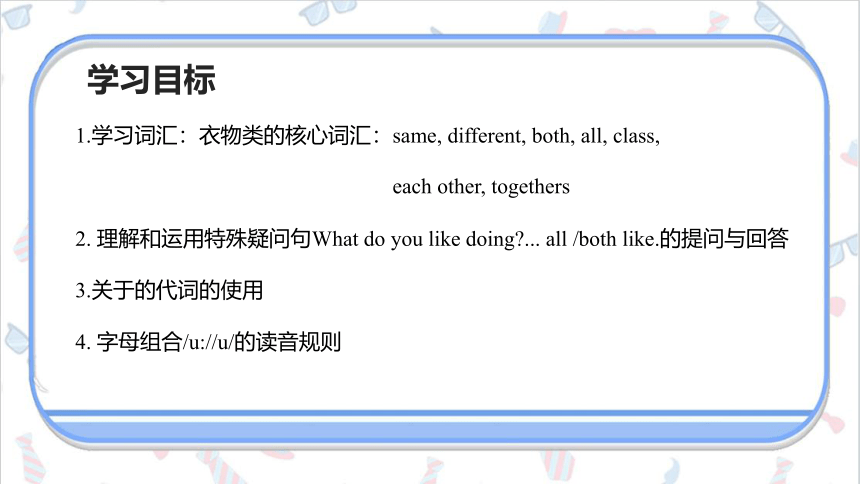
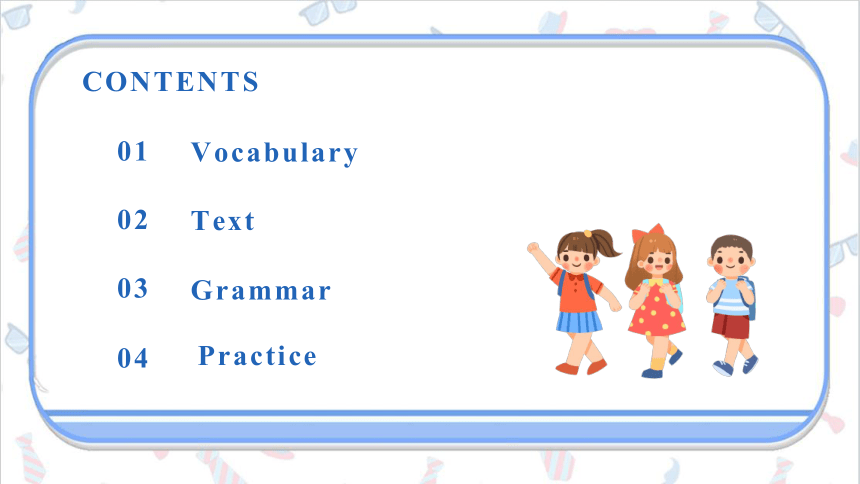
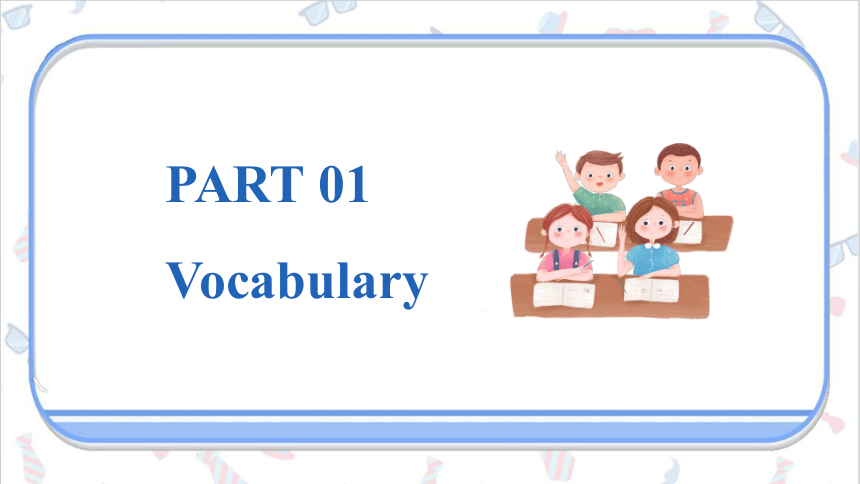
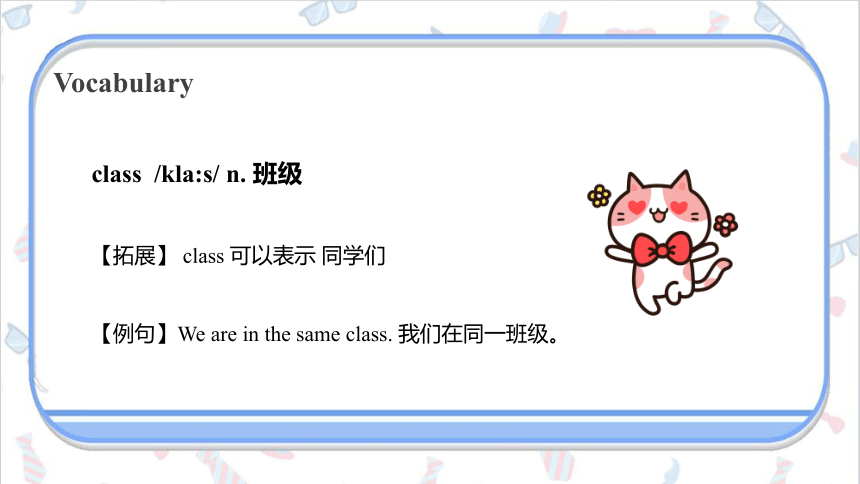
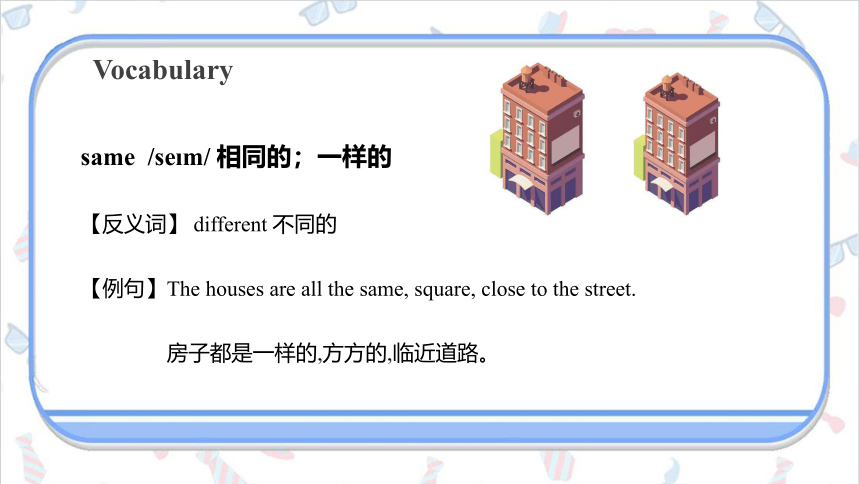
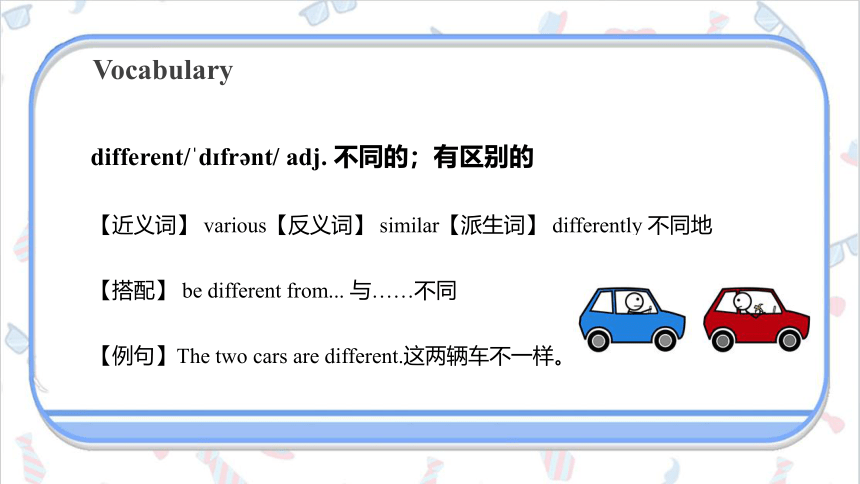

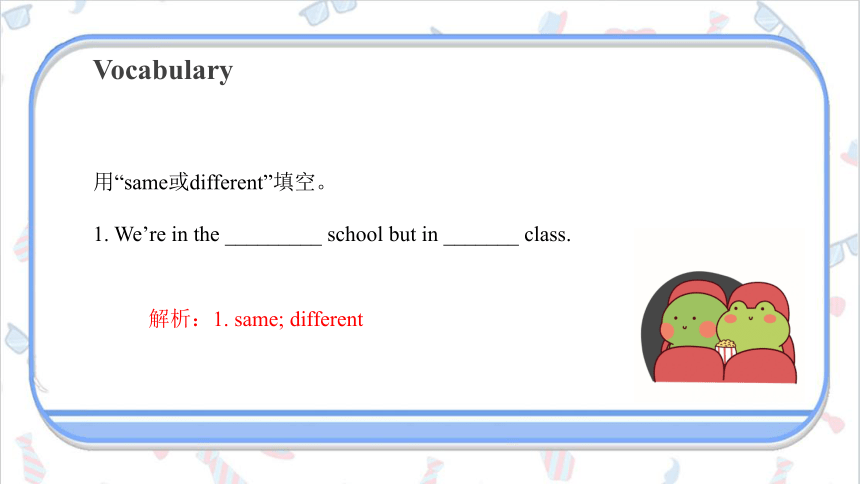
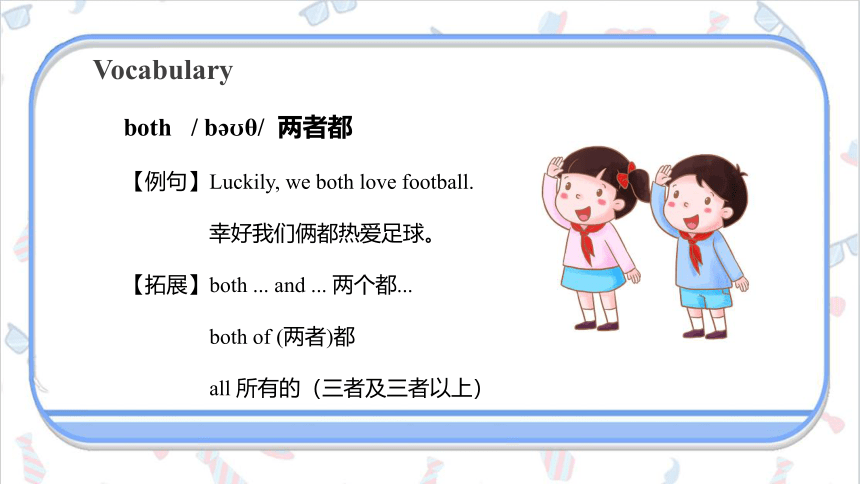
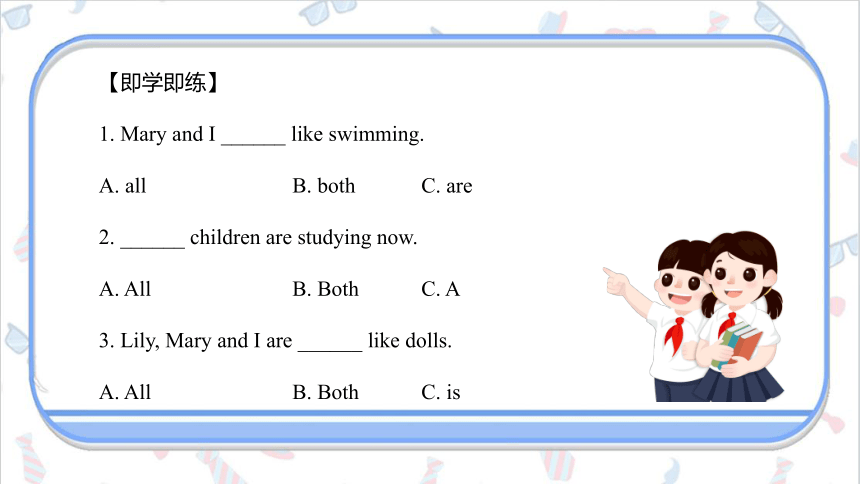
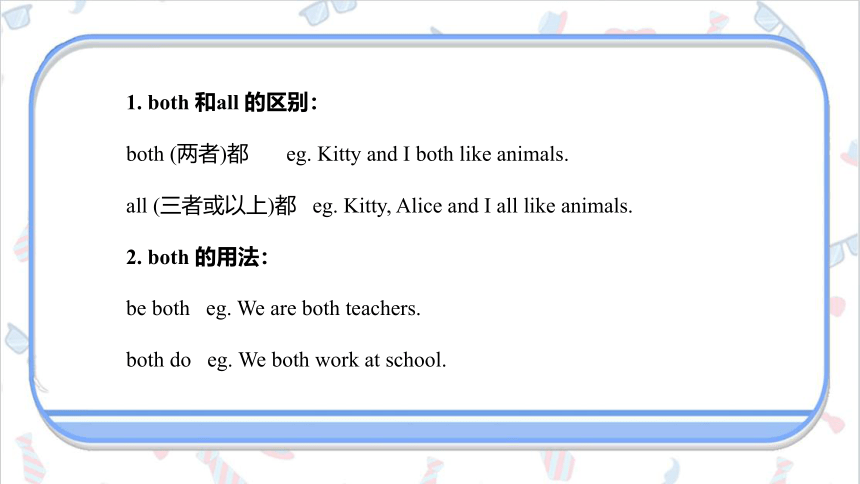
文档简介
(共79张PPT)
Module 2 Relationships
Unit 2 Friends
1.学习词汇:衣物类的核心词汇:same, different, both, all, class,
each other, togethers
2. 理解和运用特殊疑问句What do you like doing ... all /both like.的提问与回答
3.关于的代词的使用
4. 字母组合/u://u/的读音规则
学习目标
Vocabulary
01
Grammar
03
Text
02
Practice
04
CONTENTS
PART 01
Vocabulary
class /kla:s/ n. 班级
【拓展】 class 可以表示 同学们
【例句】We are in the same class. 我们在同一班级。
Vocabulary
same /se m/ 相同的;一样的
【反义词】 different 不同的
【例句】The houses are all the same, square, close to the street.
房子都是一样的,方方的,临近道路。
Vocabulary
Vocabulary
different/ d fr nt/ adj. 不同的;有区别的
【近义词】 various【反义词】 similar【派生词】 differently 不同地
【搭配】 be different from... 与……不同
【例句】The two cars are different.这两辆车不一样。
same vs. different
different 是“不同的”,它的反义词是“same”,意思是“同样的,同一的”。
same是形容词,意思是“相同的、同样的”,它是 different 的反义词,different 单独使用,但是same通常与 the 连用。
固定搭配:和……不同 be different from
和……相同 be the same as
Vocabulary
Vocabulary
用“same或different”填空。
1. We’re in the _________ school but in _______ class.
解析:1. same; different
both / b θ/ 两者都
【例句】Luckily, we both love football.
幸好我们俩都热爱足球。
【拓展】both ... and ... 两个都...
both of (两者)都
all 所有的(三者及三者以上)
Vocabulary
【即学即练】
1. Mary and I ______ like swimming.
A. all B. both C. are
2. ______ children are studying now.
A. All B. Both C. A
3. Lily, Mary and I are ______ like dolls.
A. All B. Both C. is
1. both 和all 的区别:
both (两者)都 eg. Kitty and I both like animals.
all (三者或以上)都 eg. Kitty, Alice and I all like animals.
2. both 的用法:
be both eg. We are both teachers.
both do eg. We both work at school.
选择用both或all 填空。
1. I’m Tom. Jimmy is my classmate. We study at Anting Primary School.
2. Sandy has six friends. They are twelve years old.
3. I have three dogs. They are black. We always play together. I like them. They like me too.
4. Ron and Hon are two robots. They are my good friends.
Vocabulary
each other / i t (r)/ 相互
【例句】 We're crazy about each other.
我们为彼此疯狂。
【拓展】one another 互相,彼此,多用于"三者及以上
【例句】We all try to help one another.我们都努力去互相帮助。
Vocabulary
all / l/ 所有的
【拓展】all 所有的,三者及三者以上
【例句】We're all keeping well.
我们都很健康。
together /t ɡe (r)/ 在一起,共同
【拓展】get together 一起
together with意为“和,连同”,相当于介词短语。
【例句】Why don't we go together 我们为什么不一起去呢?
Vocabulary
match / m t / n. 比赛
【例句】 We will have a football match next week.
下周我们将有一场足球赛。
【拓展延伸】match还可意为“火柴”。
【例句】Please pass me a box of matches. 请递给我一盒火柴。
Vocabulary
clever 聪明的 different 不同的
same 相同的 bored 无聊的
class 班;班级 word 单词
both (两个)都 easy 容易的
cross 穿越;越过 say 说
carry 背;提;拿 then 然后;那么
heavy 重的;沉的 ask 问
soon 很快;不久 answer 回答
Vocabulary
each other 互相 make a phone call 打电话
help people 帮助人们 cross the street 过马路
carry bags 提包;拿包 both like (两个)都喜欢
play word games 玩文字游戏
make phone calls 打电话
in the kitchen 在厨房里
in different classes 在不同的班级
my good friend 我的好朋友
walk into the forest 走进森林
PART 02
Text
Listen and say
Note:
1. same 相同的
in the same class 在相同的班级
same + 可数名词单数
2. both 两者都
我有一个朋友。她的名字叫爱丽丝。
爱丽丝和我都在彩虹小学上学。
我们在同一个班。
Listen and say
Note:
1. like sports 喜欢运动
2. play volleyball 打排球
3. play badminton 打羽毛球
我们都喜欢运动。我喜欢打排球,爱丽丝喜欢打羽毛球。
Listen and say
Note:
1. like v. 喜欢
①like+动词ing 喜欢做...
②like+名词 喜欢...
2. help sb do sth
帮助某人做某事
我们都喜欢帮助别人。
我们有时帮助老人过马路。
Listen and say
Note:
1. each other 互相
2. be together 在一起
3. good friends 好朋友
我们彼此喜欢,我们喜欢在一起。
我们是好朋友。
Look ancd learn.
Do a survey.
Do a survey.
① Danny and Peter are both members of the school's football club. They often play football after school. They are in different teams—Golden Boys and Heroes.
Say and act.
Danny: Golden Boys always win!
Peter: Heroes always win!
Danny: Let's wait and see!
Peter: Sure!
【拓展】be a member of ...是…的成员
after school 放学后
win /win/v.赢,获胜
Let's wait and see!让我们等着瞧!
② It is a difficult match for both teams. Then it is the half-time.
Say and act.
Danny: Oh no! We don't have any water.
Peter: Don't worry. We have some water. Here you are.
Danny: Thanks, Heroes.
拓展
half-time 中场休息时间
any 任一 & some 一些
some和any即可修饰可数名词又可修饰不可数名词。
some用于肯定句, any用于疑问,否定句。
③ Finally, Golden Boys win.
Say and act.
Peter: Congratulations! Your team plays very well.
Danny: Thanks. Your team plays well too.
congratulations 祝贺,恭喜well作副词,表示很好地,充分地作形容词,表示身体好的
Think and write
Think and write
Think and write
Learn the sounds
Read and choose (找出画线部分发音不同的单词)
( )1. A. same B. name C. strange D. badminton
( )2. A. both B. volleyball C. cross D. holiday
( )3. A. different B. visit C. fifth D. pilot
( )4. A. each B. leave C. bread D. dream
( )5. A. sport B. worker C. short D. horse
PART 03
Grammar
like的用法
like表示“喜欢”,后面可加动词或名词。
①like+动词ing,表示“喜欢做...”,长时间喜欢指的是兴趣爱好;
②like+ to+动词原形,表示“喜欢做...”,具体某一次的意愿;
③like+名词,表示“喜欢...”。
both 和 all 的用法
both 和all 都有“都…”的意思。表示“整体”的含义。
1) both表示“两者都”。
[用法1] both of us做主语,谓语动词用复数形式。
[用法2] both... and..两个都,谓语动词用复数形式。
Both of us are clever.我们都很聪明。
Both she and I are students .我和她都是学生。
both 和 all 的用法
2) all表示“三者以上都”,后接复数名词时,谓语动词用复数形式;后接不可数名词时,谓语动词用单数形式。
All of the milk is there.所有的牛奶都在那里。
All of the students like PE. 所有的学生都爱上体育课。
some & any 的用法
some, any 都表示一些的意思,并且都可以和可数名词或不可数名词连用。但通常情况下,some用在肯定句中,any用在否定句和一般疑问句中。它们可做为主语、宾语。
例如:(1) Some are big, and some are small. 一些很大,一些很小。
(2) I have some crayons.我有一些蜡笔。
(3) There isn't any water in the bottle.杯子里没有一些水。
some & any 的用法
表示建议或希望得到肯定回答时some,不用变成any.
例如:(1) Would you like some more fruit 你要不要再吃点水果
(2) Would you like some coffee 你想要一些咖啡吗
祈使句的肯定句式:
Let + 宾语(通常为第一或第三人称宾格)+动词原形 + 其它成分.
课文句型回顾:
让我们等着瞧吧!Let's wait and see.
翻译下列句子:
让她进来。Let her in.我们回家吧!
Let's go home!注:let us = let's
一般现在时的句子构成:
1. be动词:主语+be(am, is, are)+其它。
如:I am a boy.我是一个男孩。
2.行为动词:主语+行为动词(+其它)。
如:We study English.我们学习英语。
否定句、一般疑问句、特殊疑问句:
1. be动词的变化。
①否定句:主语+ be + not +其它。 如:He is not a worker.他不是工人。
②一般疑问句:Be +主语+其它。
如: ---Are you a student --- Yes. I am. / No, I’m not.
③特殊疑问句:疑问词+一般疑问句。如:Where is my bike
2.行为动词的变化。
①否定句:主语+ don’t ( doesn’t ) +动词原形(+其它)。
如:I don’t like bread.
当主语为第三人称单数时,要用doesn’t构成否定句。
如:He doesn’t often play.
②一般疑问句:Do( Does ) +主语+动词原形+其它。
如:--- Do you often play football
--- Yes, I do. / No, I don’t.
当主语为第三人称单数时,要用does构成一般疑问句。
如:--- Does she go to work by bike
--- Yes, she does. / No, she doesn’t.
③特殊疑问句:疑问词+一般疑问句。
如:How does your father go to work
一般现在时的动词形式
一般现在时主要由动词原形表示,但第三人称单数后的动词词尾有所变化。
第三人称单数动词词尾的变化有几种形式:
①一般情况 加-s reads, says, takes
②以ch, sh, s, x, 或o结尾的词 加-es, teaches, washes, goes, misses, mixes
③以辅音字母加y结尾的词 变y为i再加-es, studies, cries, carries
④特殊:have-has
在一般现在时中,当主语是第三人称单数时,谓语动词要用第三人称单数形式。
一、人称代词he, she, it是第三人称单数。
如:
He likes watching TV. 他喜欢看电视。
She has lunch at twelve. 她十二点吃午餐。
在一般现在时中,当主语是第三人称单数时,谓语动词要用第三人称单数形式。
二、单个人名、地名或称呼作主语;是第三人称单数。
如:
①Han Mei likes salad. 韩梅喜欢萨拉。
②Beijing is in China. 北京在中国。
③Uncle Wang often plays volleyball. 王叔叔经常打排球。
在一般现在时中,当主语是第三人称单数时,谓语动词要用第三人称单数形式。
三、单数可数名词或"this / that / the+单数可数名词"作主语时,是第三人称单数。
如: ①This book is yours. 这本书是你的。
②That car is red. 那只猫是红色的。
③The cat is Lucy's. 这只猫是露茜的。
四、不定代词someone, somebody, nobody, everything, something等及指示代词this, that作主语时,是第三人称单数。
①Everyone is here. 大家到齐了。
②There is a watch on the table. 桌上有块手表。
③This is a pen. 这是一支钢笔。
④That is an eraser.
五、不可数名词作主语时为第三人称单数。如:
①The milk(牛奶) is in the glass. 牛奶在玻璃杯里。
②That bread is very small. 那面包很小。
六、当数字或字母作主语时,看作第三人称单数。如:
①"6" is a lucky number. "6"是个吉利数字。
②"I" is a letter. "I"是个字母。
用所给动词的适当形式填空。
1. Lin Tao (like) his ruler. 2. Let’s (have) ice cream.
3. Let’s (play) tennis! 4. He (like) English.
5. Nice (meet) you! 6. I (need) some fruits.
PART 04
Sentences
I like playing volleyball and Alice likes playing badminton.
我喜欢打排球,艾丽斯喜欢打羽毛球。
小朋友们,你们知道几种球类运动呀?记下来吧!
volleyball 排球,badminton 羽毛球,football 足球,
ping-pong(table tennis)兵兵球,tennis网球,golf高尔夫球
We sometimes help old people cross the street.
有时我们帮助老人过马路。
sometimes频率副词,意为“有时”。
[例句]Sometimes I get up at 6:00 in the morning. 有时我早上六点起床。
[拓展延伸] sometimes, sometime, some times和some time的区别:
(1) sometime意为“某个时候”。
[例句]I will come to see you sometime next week.
下周某个时候我将来看你。
(2) some times 意为“几次”。
[例句]He has been to Beijing some times. 他去过北京几次。
(3) some time意为“一段时间”。
[例句]I have waited for you for some time. 我已经等你一段时间了。
Heroes always win! 英雄队常胜。
win 意为“赢,贏得”。常用搭配有win sth(victory, a prize, a race)。
[例句]Our class win the football match. 我们班赢了这场足球赛。
注意:win和beat有所不同。
beat意为“战胜,打败”,宾语通常为sb,即对手。
[例句]Our class beat Class Two and win the match.
我们班打败了二班,赢得了这场比赛。
Let's wait and see! 让我们等着瞧!
Let's =Let us 让我们
[例句]Let’s play football. 让我们踢球吧!
Let's go home! 让我们回家吧!
Here you are! 给你!
这是一个倒装句,在英语中,以here或there开头的句子一般用倒装形式。如果句子的主语是代词,谓语动词要置于主语之后。
[例句]Here it is! 它在这儿! Here they are! 他们在这里!
[拓展延伸]
(1)系动词的单复数取决于后面主语的数。
(2)如果这一句型中的谓语动词是行为动词,它还表示这个动作正在进行。
[例句]Here comes the bus. = The bus is coming. 公交车来了!
I have a good friend called Dee.
我有一个叫迪的好朋友。
called为过去分词作后置定语修饰前面的friend,在这里相当于named。
[例句]I have a lovely dog called Wangwang.
我有一只叫汪汪的可爱的小狗。
PART 05
Practice
辨音,选出与所给音标发音相同的单词:
( )1.gold A. both B. school C. good
( )2.good A. volleyball B. room C. football
( )3.glad A. help B. badminton C. same
( )4.ride A. like B. leave C. different
( )5.sun A. both B. the C. same
翻译词组或句子:
1. 一场篮球比赛 2. 观看乒乓球赛_______________
3. 放学后 4. 下课后 ______________
5. 在不同的队里 6. 等着瞧! ______________
7. 别担心。 8.祝贺你! ______________
根据句意填空
1. I like apples. He likes apples, too. We like apples.
2. My friends and I are at the same school.
3. She is in Class 5. I am in Class 2. We are in classes.
4. I like Mary and Mary likes me. We like .
5. The light is red. Don’t the street.
选择
1. – Are you two in the same team – Yes, we are in the blue team.
A. all B. both C. same
2. Kitty and Alice sweet food.
A. like both B. all like C. both like
3. – Are you all at New Hope Primary School
– No, we schools.
A. different go to B. go to different C. go different to
( ) 4. Do you like tea or coffee I want _____.
A. none B. all C. both
( ) 5. Do you want both peaches _______pears Yes, I do.
A. or B. and C. of
( ) 6.English and Math _____ ______ important.
A. are both B. are all C. both are
( ) 8. I have three pencils. They are _____ red.
A. all B. both C. neither
( ) 9. Mary and Anna are in ________ classes.
A. same B. different C. the same
( ) 10.Alice has two toys. _____ ______them are from her uncle.
A. Both of B. All of C. All the
( ) 11. My classmates like helping ______.
A. together B. both C. each other
用括号内的单词的适当形式或者中文提示填空:
1. Both of ______(we) go to Rainbow Primary School.
2. John and Sam like different ______(sport).
3. Mary likes ________(skip) a rope. ______ you_______(like) it
4. Jane, Ann and Fiona _____ _____(都是)good students in class.
5. We like to be ________(在一起).
改写句子:
1. We both like watching football match very much. (改写句子)
_______ _______ us like watching football match very much.
2. Tom and Mike like different sports. (改为反义句)
Tom and Mike like ________ ________ ________.
3. Peter and Jim are at the same school. (改为一般疑问句)
________ Peter and Jim at the same school
New friends
Hi! I’m Johnny from Room 205. I am nine years old. I like skating and riding bicycle. How about you
Hi! I’m Annie from Room 303. I am twelve. I like singing and dancing. How about you
Hi! I’m Tony from Room 505. I am eight years old. I like running and playing football. How about you
Hi! I’m Kelly from the fifteenth floor. I am ten and my sister is four. I like doing these things too. I want to play with all of you!
判断正误(正确填 T,错误填 F):
1.( ) Johnny is ten years old.
2.( ) Annie lives in Room 505.
3.( ) Tony likes playing basketball.
4.( ) Kelly has a sister.
5.( ) Kelly and Tony both like running.
首字母填空:
Peter and Paul are good f_______. They are in the s______ class and then they become good friends. They both l______ playing football. They often watch the football match t_______. On each Monday, they have P.E. c______ and play football. Sometimes they are in d__________ teams so they congratulate winning team.
Thank you!
Module 2 Relationships
Unit 2 Friends
1.学习词汇:衣物类的核心词汇:same, different, both, all, class,
each other, togethers
2. 理解和运用特殊疑问句What do you like doing ... all /both like.的提问与回答
3.关于的代词的使用
4. 字母组合/u://u/的读音规则
学习目标
Vocabulary
01
Grammar
03
Text
02
Practice
04
CONTENTS
PART 01
Vocabulary
class /kla:s/ n. 班级
【拓展】 class 可以表示 同学们
【例句】We are in the same class. 我们在同一班级。
Vocabulary
same /se m/ 相同的;一样的
【反义词】 different 不同的
【例句】The houses are all the same, square, close to the street.
房子都是一样的,方方的,临近道路。
Vocabulary
Vocabulary
different/ d fr nt/ adj. 不同的;有区别的
【近义词】 various【反义词】 similar【派生词】 differently 不同地
【搭配】 be different from... 与……不同
【例句】The two cars are different.这两辆车不一样。
same vs. different
different 是“不同的”,它的反义词是“same”,意思是“同样的,同一的”。
same是形容词,意思是“相同的、同样的”,它是 different 的反义词,different 单独使用,但是same通常与 the 连用。
固定搭配:和……不同 be different from
和……相同 be the same as
Vocabulary
Vocabulary
用“same或different”填空。
1. We’re in the _________ school but in _______ class.
解析:1. same; different
both / b θ/ 两者都
【例句】Luckily, we both love football.
幸好我们俩都热爱足球。
【拓展】both ... and ... 两个都...
both of (两者)都
all 所有的(三者及三者以上)
Vocabulary
【即学即练】
1. Mary and I ______ like swimming.
A. all B. both C. are
2. ______ children are studying now.
A. All B. Both C. A
3. Lily, Mary and I are ______ like dolls.
A. All B. Both C. is
1. both 和all 的区别:
both (两者)都 eg. Kitty and I both like animals.
all (三者或以上)都 eg. Kitty, Alice and I all like animals.
2. both 的用法:
be both eg. We are both teachers.
both do eg. We both work at school.
选择用both或all 填空。
1. I’m Tom. Jimmy is my classmate. We study at Anting Primary School.
2. Sandy has six friends. They are twelve years old.
3. I have three dogs. They are black. We always play together. I like them. They like me too.
4. Ron and Hon are two robots. They are my good friends.
Vocabulary
each other / i t (r)/ 相互
【例句】 We're crazy about each other.
我们为彼此疯狂。
【拓展】one another 互相,彼此,多用于"三者及以上
【例句】We all try to help one another.我们都努力去互相帮助。
Vocabulary
all / l/ 所有的
【拓展】all 所有的,三者及三者以上
【例句】We're all keeping well.
我们都很健康。
together /t ɡe (r)/ 在一起,共同
【拓展】get together 一起
together with意为“和,连同”,相当于介词短语。
【例句】Why don't we go together 我们为什么不一起去呢?
Vocabulary
match / m t / n. 比赛
【例句】 We will have a football match next week.
下周我们将有一场足球赛。
【拓展延伸】match还可意为“火柴”。
【例句】Please pass me a box of matches. 请递给我一盒火柴。
Vocabulary
clever 聪明的 different 不同的
same 相同的 bored 无聊的
class 班;班级 word 单词
both (两个)都 easy 容易的
cross 穿越;越过 say 说
carry 背;提;拿 then 然后;那么
heavy 重的;沉的 ask 问
soon 很快;不久 answer 回答
Vocabulary
each other 互相 make a phone call 打电话
help people 帮助人们 cross the street 过马路
carry bags 提包;拿包 both like (两个)都喜欢
play word games 玩文字游戏
make phone calls 打电话
in the kitchen 在厨房里
in different classes 在不同的班级
my good friend 我的好朋友
walk into the forest 走进森林
PART 02
Text
Listen and say
Note:
1. same 相同的
in the same class 在相同的班级
same + 可数名词单数
2. both 两者都
我有一个朋友。她的名字叫爱丽丝。
爱丽丝和我都在彩虹小学上学。
我们在同一个班。
Listen and say
Note:
1. like sports 喜欢运动
2. play volleyball 打排球
3. play badminton 打羽毛球
我们都喜欢运动。我喜欢打排球,爱丽丝喜欢打羽毛球。
Listen and say
Note:
1. like v. 喜欢
①like+动词ing 喜欢做...
②like+名词 喜欢...
2. help sb do sth
帮助某人做某事
我们都喜欢帮助别人。
我们有时帮助老人过马路。
Listen and say
Note:
1. each other 互相
2. be together 在一起
3. good friends 好朋友
我们彼此喜欢,我们喜欢在一起。
我们是好朋友。
Look ancd learn.
Do a survey.
Do a survey.
① Danny and Peter are both members of the school's football club. They often play football after school. They are in different teams—Golden Boys and Heroes.
Say and act.
Danny: Golden Boys always win!
Peter: Heroes always win!
Danny: Let's wait and see!
Peter: Sure!
【拓展】be a member of ...是…的成员
after school 放学后
win /win/v.赢,获胜
Let's wait and see!让我们等着瞧!
② It is a difficult match for both teams. Then it is the half-time.
Say and act.
Danny: Oh no! We don't have any water.
Peter: Don't worry. We have some water. Here you are.
Danny: Thanks, Heroes.
拓展
half-time 中场休息时间
any 任一 & some 一些
some和any即可修饰可数名词又可修饰不可数名词。
some用于肯定句, any用于疑问,否定句。
③ Finally, Golden Boys win.
Say and act.
Peter: Congratulations! Your team plays very well.
Danny: Thanks. Your team plays well too.
congratulations 祝贺,恭喜well作副词,表示很好地,充分地作形容词,表示身体好的
Think and write
Think and write
Think and write
Learn the sounds
Read and choose (找出画线部分发音不同的单词)
( )1. A. same B. name C. strange D. badminton
( )2. A. both B. volleyball C. cross D. holiday
( )3. A. different B. visit C. fifth D. pilot
( )4. A. each B. leave C. bread D. dream
( )5. A. sport B. worker C. short D. horse
PART 03
Grammar
like的用法
like表示“喜欢”,后面可加动词或名词。
①like+动词ing,表示“喜欢做...”,长时间喜欢指的是兴趣爱好;
②like+ to+动词原形,表示“喜欢做...”,具体某一次的意愿;
③like+名词,表示“喜欢...”。
both 和 all 的用法
both 和all 都有“都…”的意思。表示“整体”的含义。
1) both表示“两者都”。
[用法1] both of us做主语,谓语动词用复数形式。
[用法2] both... and..两个都,谓语动词用复数形式。
Both of us are clever.我们都很聪明。
Both she and I are students .我和她都是学生。
both 和 all 的用法
2) all表示“三者以上都”,后接复数名词时,谓语动词用复数形式;后接不可数名词时,谓语动词用单数形式。
All of the milk is there.所有的牛奶都在那里。
All of the students like PE. 所有的学生都爱上体育课。
some & any 的用法
some, any 都表示一些的意思,并且都可以和可数名词或不可数名词连用。但通常情况下,some用在肯定句中,any用在否定句和一般疑问句中。它们可做为主语、宾语。
例如:(1) Some are big, and some are small. 一些很大,一些很小。
(2) I have some crayons.我有一些蜡笔。
(3) There isn't any water in the bottle.杯子里没有一些水。
some & any 的用法
表示建议或希望得到肯定回答时some,不用变成any.
例如:(1) Would you like some more fruit 你要不要再吃点水果
(2) Would you like some coffee 你想要一些咖啡吗
祈使句的肯定句式:
Let + 宾语(通常为第一或第三人称宾格)+动词原形 + 其它成分.
课文句型回顾:
让我们等着瞧吧!Let's wait and see.
翻译下列句子:
让她进来。Let her in.我们回家吧!
Let's go home!注:let us = let's
一般现在时的句子构成:
1. be动词:主语+be(am, is, are)+其它。
如:I am a boy.我是一个男孩。
2.行为动词:主语+行为动词(+其它)。
如:We study English.我们学习英语。
否定句、一般疑问句、特殊疑问句:
1. be动词的变化。
①否定句:主语+ be + not +其它。 如:He is not a worker.他不是工人。
②一般疑问句:Be +主语+其它。
如: ---Are you a student --- Yes. I am. / No, I’m not.
③特殊疑问句:疑问词+一般疑问句。如:Where is my bike
2.行为动词的变化。
①否定句:主语+ don’t ( doesn’t ) +动词原形(+其它)。
如:I don’t like bread.
当主语为第三人称单数时,要用doesn’t构成否定句。
如:He doesn’t often play.
②一般疑问句:Do( Does ) +主语+动词原形+其它。
如:--- Do you often play football
--- Yes, I do. / No, I don’t.
当主语为第三人称单数时,要用does构成一般疑问句。
如:--- Does she go to work by bike
--- Yes, she does. / No, she doesn’t.
③特殊疑问句:疑问词+一般疑问句。
如:How does your father go to work
一般现在时的动词形式
一般现在时主要由动词原形表示,但第三人称单数后的动词词尾有所变化。
第三人称单数动词词尾的变化有几种形式:
①一般情况 加-s reads, says, takes
②以ch, sh, s, x, 或o结尾的词 加-es, teaches, washes, goes, misses, mixes
③以辅音字母加y结尾的词 变y为i再加-es, studies, cries, carries
④特殊:have-has
在一般现在时中,当主语是第三人称单数时,谓语动词要用第三人称单数形式。
一、人称代词he, she, it是第三人称单数。
如:
He likes watching TV. 他喜欢看电视。
She has lunch at twelve. 她十二点吃午餐。
在一般现在时中,当主语是第三人称单数时,谓语动词要用第三人称单数形式。
二、单个人名、地名或称呼作主语;是第三人称单数。
如:
①Han Mei likes salad. 韩梅喜欢萨拉。
②Beijing is in China. 北京在中国。
③Uncle Wang often plays volleyball. 王叔叔经常打排球。
在一般现在时中,当主语是第三人称单数时,谓语动词要用第三人称单数形式。
三、单数可数名词或"this / that / the+单数可数名词"作主语时,是第三人称单数。
如: ①This book is yours. 这本书是你的。
②That car is red. 那只猫是红色的。
③The cat is Lucy's. 这只猫是露茜的。
四、不定代词someone, somebody, nobody, everything, something等及指示代词this, that作主语时,是第三人称单数。
①Everyone is here. 大家到齐了。
②There is a watch on the table. 桌上有块手表。
③This is a pen. 这是一支钢笔。
④That is an eraser.
五、不可数名词作主语时为第三人称单数。如:
①The milk(牛奶) is in the glass. 牛奶在玻璃杯里。
②That bread is very small. 那面包很小。
六、当数字或字母作主语时,看作第三人称单数。如:
①"6" is a lucky number. "6"是个吉利数字。
②"I" is a letter. "I"是个字母。
用所给动词的适当形式填空。
1. Lin Tao (like) his ruler. 2. Let’s (have) ice cream.
3. Let’s (play) tennis! 4. He (like) English.
5. Nice (meet) you! 6. I (need) some fruits.
PART 04
Sentences
I like playing volleyball and Alice likes playing badminton.
我喜欢打排球,艾丽斯喜欢打羽毛球。
小朋友们,你们知道几种球类运动呀?记下来吧!
volleyball 排球,badminton 羽毛球,football 足球,
ping-pong(table tennis)兵兵球,tennis网球,golf高尔夫球
We sometimes help old people cross the street.
有时我们帮助老人过马路。
sometimes频率副词,意为“有时”。
[例句]Sometimes I get up at 6:00 in the morning. 有时我早上六点起床。
[拓展延伸] sometimes, sometime, some times和some time的区别:
(1) sometime意为“某个时候”。
[例句]I will come to see you sometime next week.
下周某个时候我将来看你。
(2) some times 意为“几次”。
[例句]He has been to Beijing some times. 他去过北京几次。
(3) some time意为“一段时间”。
[例句]I have waited for you for some time. 我已经等你一段时间了。
Heroes always win! 英雄队常胜。
win 意为“赢,贏得”。常用搭配有win sth(victory, a prize, a race)。
[例句]Our class win the football match. 我们班赢了这场足球赛。
注意:win和beat有所不同。
beat意为“战胜,打败”,宾语通常为sb,即对手。
[例句]Our class beat Class Two and win the match.
我们班打败了二班,赢得了这场比赛。
Let's wait and see! 让我们等着瞧!
Let's =Let us 让我们
[例句]Let’s play football. 让我们踢球吧!
Let's go home! 让我们回家吧!
Here you are! 给你!
这是一个倒装句,在英语中,以here或there开头的句子一般用倒装形式。如果句子的主语是代词,谓语动词要置于主语之后。
[例句]Here it is! 它在这儿! Here they are! 他们在这里!
[拓展延伸]
(1)系动词的单复数取决于后面主语的数。
(2)如果这一句型中的谓语动词是行为动词,它还表示这个动作正在进行。
[例句]Here comes the bus. = The bus is coming. 公交车来了!
I have a good friend called Dee.
我有一个叫迪的好朋友。
called为过去分词作后置定语修饰前面的friend,在这里相当于named。
[例句]I have a lovely dog called Wangwang.
我有一只叫汪汪的可爱的小狗。
PART 05
Practice
辨音,选出与所给音标发音相同的单词:
( )1.gold A. both B. school C. good
( )2.good A. volleyball B. room C. football
( )3.glad A. help B. badminton C. same
( )4.ride A. like B. leave C. different
( )5.sun A. both B. the C. same
翻译词组或句子:
1. 一场篮球比赛 2. 观看乒乓球赛_______________
3. 放学后 4. 下课后 ______________
5. 在不同的队里 6. 等着瞧! ______________
7. 别担心。 8.祝贺你! ______________
根据句意填空
1. I like apples. He likes apples, too. We like apples.
2. My friends and I are at the same school.
3. She is in Class 5. I am in Class 2. We are in classes.
4. I like Mary and Mary likes me. We like .
5. The light is red. Don’t the street.
选择
1. – Are you two in the same team – Yes, we are in the blue team.
A. all B. both C. same
2. Kitty and Alice sweet food.
A. like both B. all like C. both like
3. – Are you all at New Hope Primary School
– No, we schools.
A. different go to B. go to different C. go different to
( ) 4. Do you like tea or coffee I want _____.
A. none B. all C. both
( ) 5. Do you want both peaches _______pears Yes, I do.
A. or B. and C. of
( ) 6.English and Math _____ ______ important.
A. are both B. are all C. both are
( ) 8. I have three pencils. They are _____ red.
A. all B. both C. neither
( ) 9. Mary and Anna are in ________ classes.
A. same B. different C. the same
( ) 10.Alice has two toys. _____ ______them are from her uncle.
A. Both of B. All of C. All the
( ) 11. My classmates like helping ______.
A. together B. both C. each other
用括号内的单词的适当形式或者中文提示填空:
1. Both of ______(we) go to Rainbow Primary School.
2. John and Sam like different ______(sport).
3. Mary likes ________(skip) a rope. ______ you_______(like) it
4. Jane, Ann and Fiona _____ _____(都是)good students in class.
5. We like to be ________(在一起).
改写句子:
1. We both like watching football match very much. (改写句子)
_______ _______ us like watching football match very much.
2. Tom and Mike like different sports. (改为反义句)
Tom and Mike like ________ ________ ________.
3. Peter and Jim are at the same school. (改为一般疑问句)
________ Peter and Jim at the same school
New friends
Hi! I’m Johnny from Room 205. I am nine years old. I like skating and riding bicycle. How about you
Hi! I’m Annie from Room 303. I am twelve. I like singing and dancing. How about you
Hi! I’m Tony from Room 505. I am eight years old. I like running and playing football. How about you
Hi! I’m Kelly from the fifteenth floor. I am ten and my sister is four. I like doing these things too. I want to play with all of you!
判断正误(正确填 T,错误填 F):
1.( ) Johnny is ten years old.
2.( ) Annie lives in Room 505.
3.( ) Tony likes playing basketball.
4.( ) Kelly has a sister.
5.( ) Kelly and Tony both like running.
首字母填空:
Peter and Paul are good f_______. They are in the s______ class and then they become good friends. They both l______ playing football. They often watch the football match t_______. On each Monday, they have P.E. c______ and play football. Sometimes they are in d__________ teams so they congratulate winning team.
Thank you!
同课章节目录
- Module 1 Getting to know you
- Unit 1 My birthday
- Unit 2 My way to school
- Unit 3 My future
- Module 2 Me, my family and friends
- Unit 1 Grandparents
- Unit 2 Friends
- Unit 3 Moving home
- Module 3 Places and activities
- Unit 1 Around the city
- Unit 2 Buying new clothes
- Unit 3 Seeing the docto
- Module 4 The natural world
- Unit 1 Wate
- Unit 2 Wind
- Unit 3 Fire
